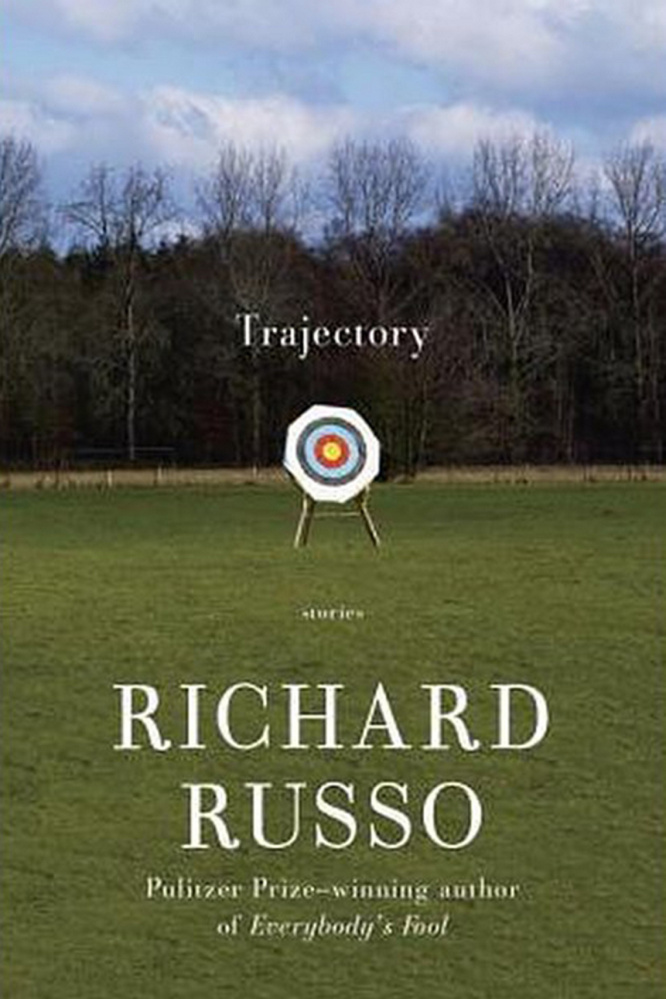“Trajectory”
By Richard Russo
Alfred A. Knopf, New York, 2017
256 pages, hardcover, $25.95
Ebook and audiobook editions available
Richard Russo’s new book, “Trajectory,” will make a nice addition for readers who have liked the fiction of the Pulitzer prize winner from Portland. It’s a compilation of four previously published short novels. In all four stories, the characters are typically well-drawn, the language is well-handled, and the atmospheres are wry, even in the midst of some grating realities. There’s a lot to be said for a sense of humor, especially in fiction.
The first two stories track the lives of a couple of academics, a milieu Russo is familiar with from his time teaching in Illinois and at Colby College. In “Horseman,” literature professor Janet Moore, still young but well-seasoned, catches a student plagiarist dead to rights. A situation which can be tricky even with hard evidence, isn’t terribly difficult for her in this case. She knows what she’s doing. Her confidence as she confronts the smug, game-playing student (“Hadn’t he vacillated, all semester, between sullen inattention and stubborn obstruction in class, then, out in the hall, plied her with half apologies and assurances that he didn’t mean to be a pain in the ass? But you are a pain in the ass,” she rehearses) turns out to be a gateway into the many insecurities of her whole academic and personal life, going back to her grad student crush on a high-profile literature professor and up through her rocky home life, which includes a quirky husband and an autistic son. Her few faculty friends are at least as much hindrance as help, and the end unfolds her feeling of being awash in the gray areas of the academic life. This story will ring very true to readers familiar with the faculty offices.
Also on the theme of college professors in limbo, “Voice” tells the story of literature professor Nate, whose retirement has become so claustrophobic he’s let his estranged brother Julian talk him into going with a tour group to Venice. Nate is painfully self-conscious around the unfamiliar people in the group who largely just remind him of his lifelong social failures, and Julian, with whom Nate is reconnecting for the first time in decades, is as blustery, crass and manipulative as ever. Nate gets lost among the canals, has an unnerving accidental cell phone conversation with his ex, gets charged $20 for a cappuccino, and completely misreads the intentions of the single women on the tour. The secret in the narrative tent is a student at the center of problems for Nate that ended up with the college administrators disburdening him of any more emeritus seminars. What happened wasn’t what you think, and the whole story is hilarious and deeply, deeply pathetic. Humanities academics, once again, will recognize the ironies and the well-drawn characters, in and outside the classroom.
“Intervention” is the story of an aging, startlingly good-natured real estate salesman who is trying to sell an almost unsellable house in a Maine coastal city, and who has all kinds of tricks to help him not think about a serious, but treatable, medical condition. And “Milton and Marcus” is the story of an aging screenwriter who is just as happy to have been out of work for some time, but who gets a phone call asking him to come back to work on a screenplay he’d worked up as a treatment decades earlier, then, for various reasons, forgot about. He needs the money, so he agrees to disrupt his not quite easygoing life in New England and spend a weekend with some film producers in Utah. Along the way we get the backstory of the stalled project (a meat and potatoes detective story titled “Milton and Marcus”) and cleverly fleshed out film industry characters. I found it hard not to think of this story as a perfectly tenored fictional update on Joan Didion’s wry 1973 essay, “In Hollywood.”
Richard Russo is a very skillful writer, which is one reason his novel “Empire Falls,” set in a small Maine town, won the Pulitzer Prize for fiction in 2002. “Skillful” can mean a lot of things at the high end of the literary world, and luckily for us, in this case it indicates not only surface polish, but also entertaining at several levels out.
“Trajectory” is available online in hardback, ebook and audio editions. Russo’s recent novels are “Everybody’s Fool” and “That Old Cape Magic.”
Off Radar takes note of poetry and books with Maine connections the first Thursday of each month. Contact Dana Wilde at universe@dwildepress.net.
Send questions/comments to the editors.



Comments are no longer available on this story